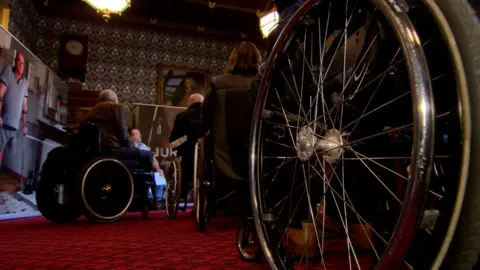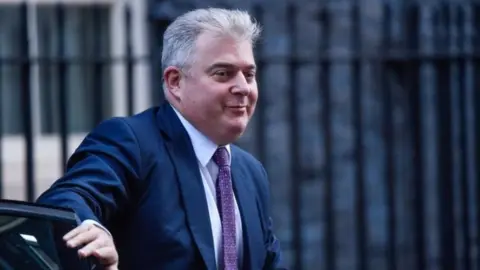Troubles' pension: 'Cost rests with Stormont'
 BBC
BBCThe NI Secretary has said he shares the "huge frustration" caused by a delay to Troubles pensions.
However, he has insisted the estimated £100m cost rests with Stormont.
Speaking on BBC Northern Ireland's The View, Brandon Lewis said: "This was agreed as part of the budget the executive have."
First Minister Arlene Foster had earlier said the scheme was unaffordable without extra Treasury funding.
Victims who qualify for payments are angry that the scheme will not open for applications on 29 May as planned.
As well as the financial logjam, there has been no progress to appoint a department to operate the scheme.
Mr Lewis said he was "hopeful" that would be sorted out "in the imminent near future".
"The first minister is absolutely determined to get this delivered and is as frustrated as we all are that this has taken too long already," he said
He and Mrs Foster have spoken about the issue.
Mrs Foster said it was "unseemly" that the government was letting down victims.
The pension was agreed in 2014 and signed into legislation in January.
NI Victims Commissioner Judith Thompson said there was an urgency to resolving the matter.
"These people are mostly elderly, mostly by the nature of their injuries are vulnerable," she said.
"These people have suffered enough, they have campaigned for what they are now entitled to and they now have the added trauma and insult of watching government departments fighting over who pays for it. It's not acceptable."
Thousands of applications expected
Victims physically or psychologically injured "through no fault of their own" are to receive between £2,000 and £10,000 annually.
More than 40,000 people were injured during the Troubles and the scheme anticipates receiving thousands of applications, with payments back-dated to 2014.
MPs passed laws last year to set up the scheme but Stormont will oversee it.
It is due to open by the end of May with the money for the payments expected to come out of the NI block grant from Westminster.
Speaking to a Stormont committee on Wednesday, Mrs Foster said she was "disappointed" more progress had not been made, but stressed the executive has been focused on tackling the Covid-19 pandemic.
"It hasn't happened as fast as we would have liked it to, but the commitments were made in Westminster and we still haven't had clarity on funding," she said.
On Thursday, the first minister spoke to the Northern Ireland secretary and "urged him to stand by the legislation passed in Westminster and fund the pension."
"This pension was a massive step forward for innocent victims," she said.
"It is unseemly that these deserving people are being let down due to the government not releasing funding."
However, Mr Lewis said: "The agreement as it stands says that this would be paid for from the bulk grant that is with the Northern Ireland Executive.
 Getty Images
Getty Images"The first stage is to designate what department is going to run this for the Northern Ireland Executive.
"I'm hopeful we'll see that done in the imminent near future."
The first minister said funding it from the NI block grant was not feasible, and discussions with Treasury were ongoing.
"It is difficult to form a way forward until we know where the funding is coming from," she added.
Westminster sources have previously said an extra £100m was added to money given to Northern Ireland, intended for Troubles legacy matters, bringing it to £250m in total.

What is the Troubles' pension?
It was drawn up in 2019 by the UK government, when the Stormont assembly was not functioning.
The Troubles claimed more than 3,500 lives and the Northern Ireland Office has estimated another 40,000 people were injured.
The scheme aims to provide pension-like payments to victims of the Troubles, every year for the rest of their lives, with payments ranging from £2,000 to £10,000.
Victims will be eligible to apply if they were injured in an incident at any point between 1 January 1966 and 12 April 2010, the date that responsibility for policing and justice was devolved to Stormont.
The scheme will also be open to those injured in incidents that took place outside Northern Ireland.
The pensions will be backdated to 2014 - the date when they were first agreed, in principle, by the Stormont parties under the Fresh Start Agreement.
Older victims, over the age of 60, may opt to receive a lump sum rather than annual payments.
Most people will be assessed on medical records but face-to-face assessments will be used if this is not possible.
There will also be provisions to extend payments to those who care for Troubles' victims for more than 35 hours a week.
In the event of a Troubles victim's death, there will be provisions to make a payment to their loved ones.

Who decides how payments are made?
A judge-led board will decide who qualifies for the scheme, with the government insisting it would only apply to people who were injured "through no fault of their own".
However, that criteria was criticised by campaigners who argued it is an attempt to circumvent the definition of a victim contained in the 2006 Victims and Survivors Order.
That definition identified a victim or survivor as someone who has been "physically or psychologically injured as a result of or in consequence of a conflict-related incident" but it made no reference to an individual's culpability.
The board will have the power to exclude applicants with unspent convictions.
Ulster Unionist assembly member Doug Beattie asked if the executive should apologise to victims and explain why the deadline would not be met.
Mrs Foster said she was committed to implementing the legislation as a "legitimate expectation" had been raised, which must be fulfilled.
Deputy First Minister Michelle O'Neill said she had met victims' groups and wanted to ensure the payment was made to allow them a "better quality of life".
Allow Twitter content?
Kenny Donaldson, director for victims' group the South East Fermanagh Foundation (SEFF), said it would raise fresh fears over the payments for victims and survivors.
"Innocent victims and survivors who were seriously injured as a result of a 'Troubles-related incident' were advised by government and others that the scheme would be operational as of 30 May 2020.
"Today's development will cause a great deal of distress to them."
He added: "Does it represent yet another false dawn in their battle for acknowledgement and recognition?
"Many will also point to the situation of the HIA [Historical Institutional Abuse} and how matters have been progressed in this regard (and rightly so) but will question; why is politics yet again being played with victims/survivors of the Troubles?"
Victims' Commissioner Judith Thompson will be discussing the Troubles' pension issue with Mark Carruthers on The View on Thursday night at 22:45 BST on BBC One.
